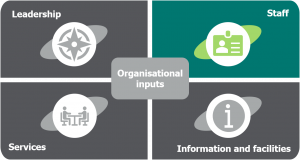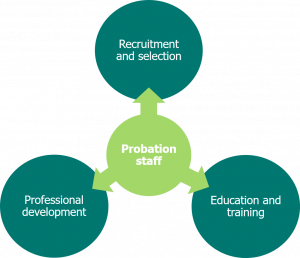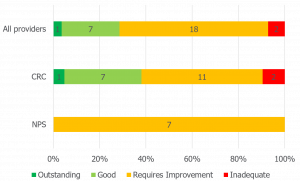Staff

Key findings
- The highest performing organisations ensure that their staff are engaged and have the necessary resources, competencies and support to deliver to a quality service.
- There should be continual and holistic reviews of individual workloads, accounting for the differing demands of individual cases.
- Sufficient attention needs to be given to the emotional demands of probation work – jobs requiring high levels of emotional labour can lead to burnout.
- Timely feedback, performance discussions and coaching should be used to empower staff to build on their strengths and address any behaviours that are getting in the way of improved performance.
- Evaluations have identified the positive impact of staff training upon effective practice and outcomes for service users.
- In the highest performing organisations, continuous learning has been found to be embedded within the culture of the organisation.
Background
The Council of Europe guidelines on the recruitment, training and professional development of probation staff set out the following key principle:
‘Staffing levels of prison services and probation agencies should be sufficient, especially of staff in daily contact with suspects and offenders. Staff should have a professional status and adequate training which allows them to have a sound understanding of their duties and the ethical requirements of their work. This will enable them to fulfil their everyday tasks and the overall purpose of the services they belong to. Staff should function within the context of high professional ethics based on treating suspects and offenders humanely and with respect for their human dignity.’ (Council of Europe, 2019)
An education and training matrix included in the guidelines provides further detail on some of the key elements required to carry out the probation role, covering areas such as:
- working effectively to promote change
- promoting compliance and dealing with non-compliance
- case management
- report writing
- programmes and interventions
- risk assessment
- anti-discriminatory practice.
The need for staff to understand the evidence base underpinning areas of practice is emphasised. This is particularly important in the area of risk assessment, where any tool should be used to assist professional judgement, rather than to replace it.
The Council of Europe guidelines focus specifically on probation staff working directly in a supervisory capacity with service users. The need for more specialist training for staff with managerial and leadership responsibilities is also recognised, as is the need to maintain education and training over the course of a person’s career. The guidelines recommend that in-service training should be linked with frameworks for Continuous Professional Development (CPD), and that training should be regularly reviewed to ensure relevance to the roles and tasks of probation agencies. Furthermore, appraisal systems should be developed that consider staff training needs and opportunities for enhancing professional development.

Summary of the evidence
Importance of engagement
There is an increasing body of evidence demonstrating the benefits of employee engagement. Engaged employees with high wellbeing are more attached to their organisation than those with lower wellbeing, and higher employee engagement has been found to correlate with greater productivity. Organisations should thus strive for high levels of staff satisfaction and engagement, with staff proud of the organisation as a place to work and highly motivated to deliver positive outcomes. There should be a culture of appreciation through which staff feel valued and recognised for their efforts and performance. At the same time, organisations must support staff in what can be extremely demanding and complex work – staff need to have the necessary resources, competencies and support to do their jobs well and deliver a quality service.
Staffing and workload levels
Excessive pressure at work can have a significant adverse effect on employee health and wellbeing, and staff under unreasonable levels of stress have been found to work less effectively and make less effective decisions. An adequate staff complement is thus essential to an organisation’s effectiveness and efficiency. There should be continual and holistic reviews of individual workloads, accounting for the differing demands of individual cases – only if workloads are reasonable can individual members of staff achieve their best practice. Staffing structures and levels should be proactively monitored and reviewed (including the use of volunteers and mentors), with people’s skills and abilities matched to the demands of the specific roles. There should be a focus upon current and likely future demands, reflected in the approach to recruitment, career development, mobility and succession planning.
It is particularly important that sufficient attention is given to the emotional demands of probation work – the evidence indicates that jobs requiring high levels of emotional labour can be harmful to staff wellbeing and lead to burnout.
Staff supervision
The research evidence highlights the need to empower staff to build on their strengths and address behaviours that are getting in the way of improved performance, with staff clearly understanding what they need to do to improve the quality of their work and being actively supported in striving for high performance. Giving and seeking timely feedback, engaging in performance discussions, and coaching should be a core part of the day-to-day running of an organisation. Managers should be approachable and available when needed, and meet regularly with their staff. They should provide sound professional guidance, challenge, encouragement and motivation, with thoughtful, honest and constructive feedback on performance. Managers should also assess whether staff are adequately resourced and supported in undertaking their work (including any specialist roles), and pay attention to personal and career development, supporting staff to achieve their goals.
Learning and development
Evaluations have identified the positive impact of staff training (e.g. interpersonal skills training for responsible officers) upon effective practice and outcomes for service users. Staff should have the full range of skills, knowledge and experience to deliver a high-quality service, with learning and development opportunities provided to enable them to achieve their full potential, considering their differing tasks and responsibilities, and their stages of career development. The organisation should give attention to equality of access to training, with appropriate flexibility to meet all needs.
In the highest performing organisations, continuous learning has been found to be embedded within the culture of the organisation, with employees encouraged to develop and utilise their skills. Staff should feel deeply involved in their own professional development, and be encouraged and proactively supported to undertake self-evaluation, reflect on and debate their practice, acquire new skills, and disseminate best practice, creating an open dialogue throughout the organisation.
![]() Find out more about supervision skills
Find out more about supervision skills
In our 2018/2019 inspections of probation providers, we considered whether the staff within each organisation were empowered to deliver a high-quality, personalised and responsive service for all service users. Across the 28 inspections, one provider received an ‘Outstanding’ rating, with seven receiving a ‘Good’ rating, eighteen rated as ‘Requires improvement’ (including all seven NPS divisions – the main driver being the levels of probation officer vacancies), and two rated as ‘Inadequate’.

Further analysis of our 2018/2019 inspection date revealed a clear need for an increased focus upon workload manageability. Less than half (46 per cent) of the interviewed responsible officers felt that their workloads were manageable, and there was a notable drop in the quality of delivery, and the practitioners’ views on manageability, when caseloads increased beyond 50 cases. The importance of practitioner skills was also very evident, with marked reductions in the quality of delivery when responsible officers felt that they did not have the skills, ability and knowledge necessary to supervise their caseloads. One in three responsible officers felt that their organisation did not provide them with sufficient access to in-service training.

Chadwick, N., Dewolf, A. and Serin, R. (2015). ‘Effectively training community supervision officers: a meta-analytic review of the impact on offender outcome’, Criminal Justice and Behavior, 42(10), pp. 977-989.
Council of Europe (2019). Guidelines Regarding Recruitment, Selection, Education, Training and Professional Development of Prison and Probation Staff.
Customer Service Excellence (2012). The Customer Service Excellence Standard. London: Customer Service Excellence.
Dowden, C. and Andrews, D. A. (2004). ‘The importance of staff practice in delivering effective correctional treatment: a meta-analytical review of core correctional practice’, International Journal of Offender Therapy and Comparative Criminology, 48(2), pp. 203-214.
Engage for Success (2014). The Evidence: Wellbeing and Employee Engagement.
EFQM (2012). EFQM Excellence Model. Brussels: EFQM.
Investors in People (2015). The Standard. London: Investors in People.



